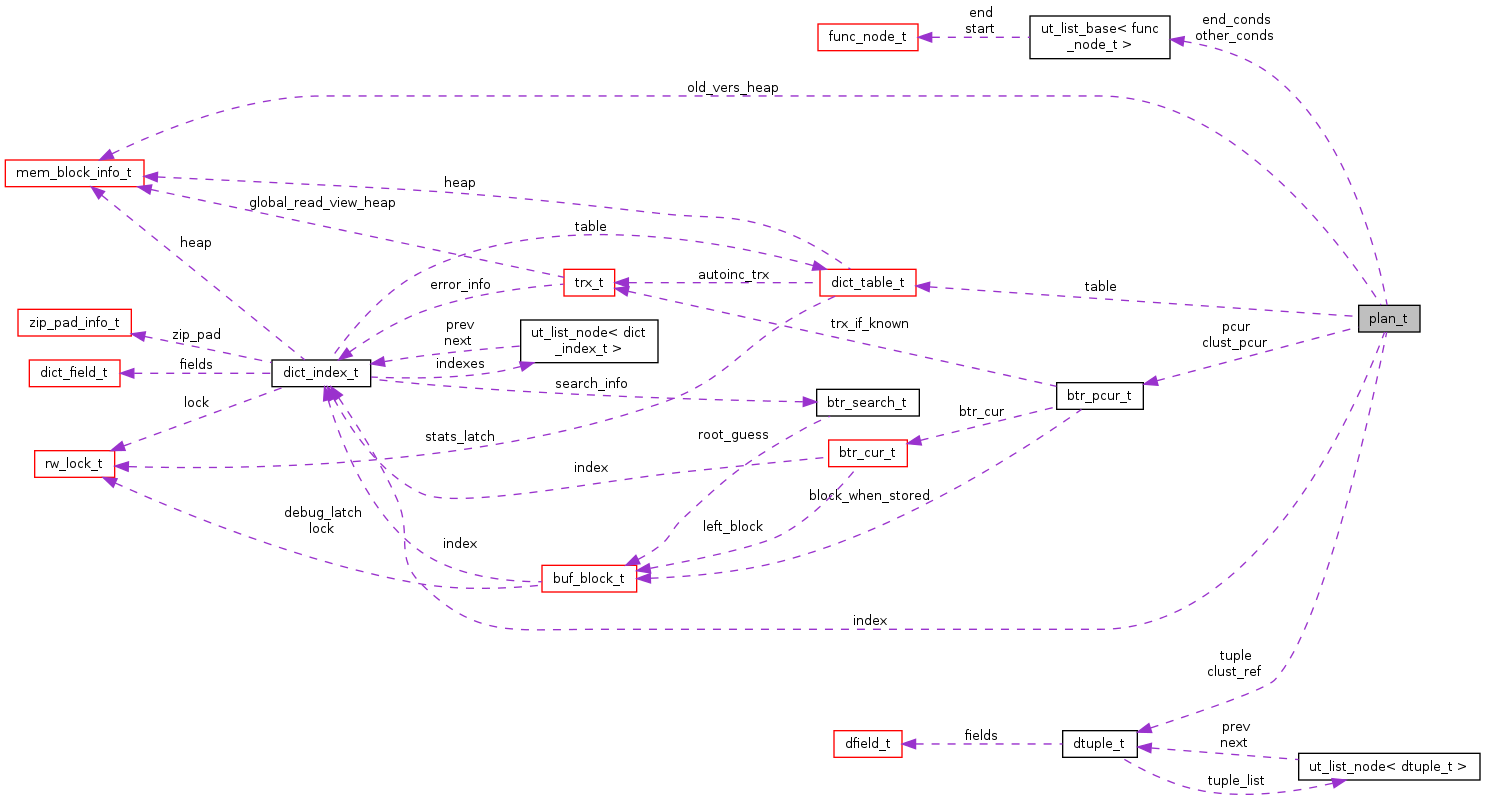#include <row0sel.h>

Data Fields | |
| dict_table_t * | table |
| dict_index_t * | index |
| btr_pcur_t | pcur |
| ibool | asc |
| ibool | pcur_is_open |
| ibool | cursor_at_end |
| ibool | stored_cursor_rec_processed |
| que_node_t ** | tuple_exps |
| dtuple_t * | tuple |
| ulint | mode |
| ulint | n_exact_match |
| ibool | unique_search |
| ulint | n_rows_fetched |
| ulint | n_rows_prefetched |
| ulint | first_prefetched |
| ibool | no_prefetch |
| sym_node_list_t | columns |
| ut_list_base< func_node_t > | end_conds |
| ut_list_base< func_node_t > | other_conds |
| ibool | must_get_clust |
| ulint * | clust_map |
| dtuple_t * | clust_ref |
| btr_pcur_t | clust_pcur |
| mem_heap_t * | old_vers_heap |
Detailed Description
Query plan
Field Documentation
| ibool plan_t::asc |
TRUE if cursor traveling upwards
| ulint* plan_t::clust_map |
map telling how clust_ref is built from the fields of a non-clustered record
| btr_pcur_t plan_t::clust_pcur |
if index is non-clustered, we use this pcur to search the clustered index
| dtuple_t* plan_t::clust_ref |
the reference to the clustered index entry is built here if index is a non-clustered index
| sym_node_list_t plan_t::columns |
symbol table nodes for the columns to retrieve from the table
| ibool plan_t::cursor_at_end |
TRUE if the cursor is open but we know that there are no more qualifying rows left to retrieve from the index tree; NOTE though, that there may still be unprocessed rows in the prefetch stack; always FALSE when pcur_is_open is FALSE
| ut_list_base< func_node_t > plan_t::end_conds |
conditions which determine the fetch limit of the index segment we have to look at: when one of these fails, the result set has been exhausted for the cursor in this index; these conditions are normalized so that in a comparison the column for this table is the first argument
| ulint plan_t::first_prefetched |
index of the first cached row in select buffer arrays for each column
| dict_index_t* plan_t::index |
table index used in the search
| ulint plan_t::mode |
search mode: PAGE_CUR_G, ...
| ibool plan_t::must_get_clust |
TRUE if index is a non-clustered index and we must also fetch the clustered index record; this is the case if the non-clustered record does not contain all the needed columns, or if this is a single-table explicit cursor, or a searched update or delete
| ulint plan_t::n_exact_match |
number of first fields in the search tuple which must be exactly matched
| ulint plan_t::n_rows_fetched |
number of rows fetched using pcur after it was opened
| ulint plan_t::n_rows_prefetched |
number of prefetched rows cached for fetch: fetching several rows in the same mtr saves CPU time
| ibool plan_t::no_prefetch |
no prefetch for this table
| mem_heap_t* plan_t::old_vers_heap |
memory heap used in building an old version of a row, or NULL
| ut_list_base< func_node_t > plan_t::other_conds |
the rest of search conditions we can test at this table in a join
| btr_pcur_t plan_t::pcur |
persistent cursor used to search the index
| ibool plan_t::pcur_is_open |
TRUE if pcur has been positioned and we can try to fetch new rows
| ibool plan_t::stored_cursor_rec_processed |
TRUE if the pcur position has been stored and the record it is positioned on has already been processed
| dict_table_t* plan_t::table |
table struct in the dictionary cache
| dtuple_t* plan_t::tuple |
search tuple
| que_node_t** plan_t::tuple_exps |
array of expressions which are used to calculate the field values in the search tuple: there is one expression for each field in the search tuple
| ibool plan_t::unique_search |
TRUE if we are searching an index record with a unique key
The documentation for this struct was generated from the following file:
- include/row0sel.h
 1.8.1.2
1.8.1.2